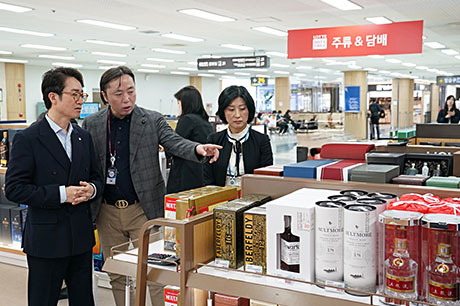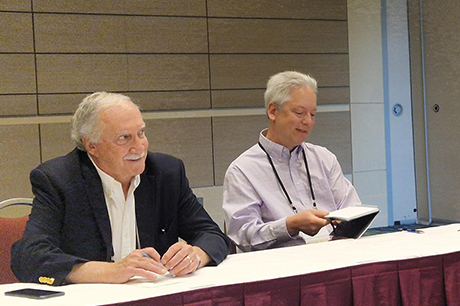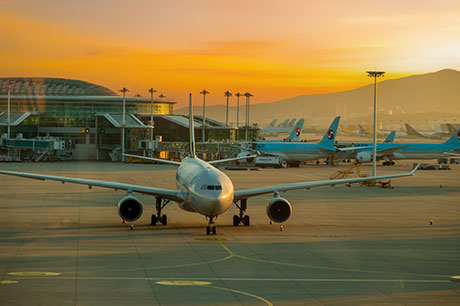Trinity Forum 2015 opens in Hong Kong
By Doug Newhouse |
 The Trinity Forum 2015 began today with 390 delegates at Hong Kong’s Intercontinental Hotel where the theme was to ’zero in’ on the consumer, while examining the upside of ‘true industry stakeholder collaboration’ with the theme: Putting the consumer at the heart of the Trinity.
The Trinity Forum 2015 began today with 390 delegates at Hong Kong’s Intercontinental Hotel where the theme was to ’zero in’ on the consumer, while examining the upside of ‘true industry stakeholder collaboration’ with the theme: Putting the consumer at the heart of the Trinity.
Martin Moodie, Chairman and Founder of The Moodie Report began by thanking the sponsors of the previous night’s cocktail party and the sponsors for the coming day, before introducing a short film showing some of the changes that have taken place in the last 12 months from takeovers, to MERS, to big operator achievements and F&B developments.
 Moodie described this as a snapshot of the year with currency movements arguably one of the biggest challenges bringing this year’s forum to a seminal point. He also posed the question whether the industry isn’t actually now at a tipping point, with the business having been pushed along comfortably in the recent past.. but what happens if that growth slows, he asked?
Moodie described this as a snapshot of the year with currency movements arguably one of the biggest challenges bringing this year’s forum to a seminal point. He also posed the question whether the industry isn’t actually now at a tipping point, with the business having been pushed along comfortably in the recent past.. but what happens if that growth slows, he asked?
He then asked the audience if they had the chance to recreate the industry would the reproduce the same model all over again – especially with the benefit of hindsight that we all have today that airports and airlines do not always work that well together when it comes to sharing data.
He also quoted L’Oréal’s TR Managing Director Vincent Boinay as referring to the DF&TR business as the sixth continent, but also making the point that the current tender process might even kill the business. Moodie also mentioned the decision by two brandowners to pull away from the business recently as the result of yet more pressure. But he also argued that the industry does not make enough of its unique aspects.
He then introduced ACI World’s Director General Angela Gittens, who also thanked the host Hong Kong International Airport and the other sponsors before making what was essentially a very data-led presentation. She provided an overview from ACI World’s traffic report covering 2,200 airports and talked about regional market growth, individual airports and their respective rankings.

Angela Gittens said she hopes that airports and brands will continue to recognise the need to work together to make the overall business grow.
She said it is important to recognise that 69% of airports still lose money, although readily acknowledging the huge contribution from non-aeronautical revenues, with retail concessions accounting for 28% – the leading contributor. This is against a historic background of strong worldwide traffic with the expectation that this will continue and Gittens said she hopes that airports and brands will continue to recognise the need to work together to make the overall business grow.
Dermott Davitt, President of The Moodie Report then introduced Fred Lam, the CEO from the host Airport Authority of Hong Kong who pointed to the airport’s 58,000sq m retail area where the retail business contributes more than 40% of the airport’s turnover. He said the general aim is to try and offer ‘something for everyone’ in both retail and dining.
On the airside he said the current mission is to try and refine the ‘Hong Kongness’ when it comes to retail and F&B offers, while balancing this against the many international brands. This is against a picture of traffic growth at HKIA that has proved much faster than expected, with over 60m passengers last year, a total achieved some four years ahead of the airport’s original forecast.
Lam also pointed to the expected completion of the Midfield Concourse by the end of this year, with another 100,000sq m of space, 20 aircraft parking stands and capacity to handle another 10m passengers. In the longer term he says the airport will also have a three-runway system on 600 hectares of reclaimed land and a new passenger concourse comprising 283,000sq m.
All of this is moving towards the 100m-passenger mark expected by 2030, said Lam, as he concluded by saying that the future is bright as HKIA continues to be ‘one of the crown jewels of our city’. He also cheekily reminded the audience to remember to take something back home from HKIA’s shops….
TMR’s Davitt then introduced a special presentation from Philippe Schaus, the Chairman & CEO, DFS Group who began by naming Marco Polo as the first real intercontinental traveller. He then pointed to the huge growth in passenger traffic since 9/11, with an additional 43m passengers every year since, as the international total moves ever closer to 1.8bn a year.
Schaus said brands are now global, travellers are looking for them and non-aeronautical revenues have grown strongly, with airports structuring their retail offerings much more efficiently. In the next 25 years he said the growth is going to come from the Asia Pacific region and Chinese travellers will be a big part of this over the next five in particular – as DFS’ main customer.
Then, in a neat change of tone he made the point that ‘a smooth sea never made a skilled sailor’ in reference to the pressured marketplace. He said the first challenge is deflation after many years when average prices have risen and this is going to affect consumption.
Volatility in the marketplace will also be a factor and he made the point that the Hong Kong protestors in Central had a very detrimental impact on shopping at their height. Schaus also pointed to ‘acts of God’ such as MERS in South Korea and the tragedies in Malaysia and Thailand as brakes on travel, without even getting into the massive impact that currency movements have had on the business.
Turning to the Chinese traveller Schaus also said that it might be one country, but it is obviously made up of many, many provinces with the incidence of travel varying widely between these differing areas. While Hong Kong and Macau are still very relevant as the most popular destinations, Schaus said they are losing their share with much of the growth now directed to Japan because of the very favourable currency situation (and reasonably close proximity by air to China)
Major compound annual growth rates (CAGR) to 2020 are now expected to be Japan 31%, US 28%, Europe 26% and South East Asia 18%. He said that mobile technology is also ingrained in Asia and this is driving new ways to travel, just as FIT travellers are increasingly interested in experiences, culture and many more diverse activities than before.

Schaus said brands are now global, travellers are looking for them and non-aeronautical revenues have grown strongly, with airports structuring their retail offerings much more efficiently.
This change in the travel retail value equation is also impacting on the global travel value ecosystem with instant pricing, transparency and product accessibility. Added to that is the Chinese Government clampdown on corruption which has changed the habits of many Chinese.
Where once there might have been wine in the restaurant, it may now be water and wearing a gold watch is not so acceptable with the gold versus silver watch mix now changed significantly amongst Chinese.
Instant price comparisons are also breaking down the old pricing architecture with the relatively fixed pricing system of some 20 years geared to individual nationalities of travellers. Currency movements have also upset this cart, according to Schaus. Such are the differences in pricing between Europe and Asia today that if a traveller buys one bag and watch in Europe today, the chances are that he or she will have paid for the increased cost of the trip from Asia to Europe with the savings.
The increased incidence of China offering luxury products within the country has also increased competition and Schaus then posed some questions which he readily admitted he did not have the answers to. Firstly, how is the Trinity going to provide a compelling proposition in future and how can the industry embrace digitalisation as Trinity partners look to simplify and enhance the customer’s journey? He also said that if growth in sales per passenger is no longer a valid measure, then what is the winning Trinity partnership formula?
Having said all this, Schaus said that DFS still believes in unique experiences, as he showed off the retailer’s relatively new duplex liquor shop in Changi Airport Terminal 3. He then showed a bottle of Dalmore Constellation malt whisky to make a premium point, explaining that this bottle had been sold just a few weeks earlier for the equivalent price of 10,900 premium bottles….
Schaus said there may be a reimaging of downtown travel retail and a balancing of luxury and accessibility, but always in a luxurious environment and he referenced the company’s new Macau Galaxy T Galleria and DFS’ Hong Kong downtown business.
He also gave the example of a Cartier watch exclusivity with DFS which allowed the retailer to show this off while no other retailer had it and how that had proved very successful. He also emphasised the importance of creating the true sense of a destination, as he referenced the T Galleria that is being built in Siem Reap in Cambodia.
Last, but not least, he returned the audience to the city of Venice where his presentation began, pointing out that it has 20m visitors a year, but the retail is quite scattered. He said DFS believes it can offer a great experience in this city when it opens its new Galleria in a year’s time.
The next presentation was entitled ‘A global view of changing consumer communication’, with Jean-Charles Decaux, Executive Board Chairman and the Co-CEO of JCDecaux. He pointed to the company’s presence in 150 airports and explained that the effectiveness of this environment outperforms the rest of the advertising market by a mile.
This was then followed by an industry tribute in honour of ‘an industry legend’ who just happened to be Robert Warren Miller – the first inductee in ‘The Travel Retail Hall of Fame. To most students of duty free he is the co-founder of DFS Group (with Chick Feeney). Miller received the award in person to a huge round of applause, describing it as an honour on what has been ‘an incredible journey’ – although it is still far from over, considering he still holds a substantial minority shareholding in DFS Group.
After this change of pace it was time for ‘China’s changing role in the travel retail industry’ from Peng Hui, the Chairman of China Duty Free Group. He began by saying that Chinese tourism is now operating under ‘the new normal’ with the Chinese Government now paying tourism a lot of attention as it tries to encourage the industry.

Peng Hui said there were 116m outbound Chinese travellers last year, representing a 17% increase on the 2013 number and this market is expected to become even more vibrant by 2017 when the forecast is for 18% growth.
Peng Hui said there were 116m outbound Chinese travellers last year, representing a 17% increase on the 2013 number and this market is expected to become even more vibrant by 2017 when the forecast is for 18% growth. Chinese purchasing power currently stands at around $3,000 per capita today, although destination shopping is undergoing changes, he said.
Hong Kong and Macau may still be the top destinations, but virtually echoing the earlier words of DFS’ Philippe Schaus, he said that the tourist trends are now leaning in the directions of Japan, Australia, the US and European countries.
Mobile applications are also making a big difference in terms of simplifying travel for people and making it all increasingly convenient, according to Peng Hui, with FIT travellers dominating the market.
He added that there are also some new trends in China’s travel retail market and one key area is the very fast growth of tier 2 and tier 3 city travellers. He said that the Chinese Government has also launched a very serious initiative to try to retain some of this spending within the country – a subject covered by TRBusiness many times before.
The rules governing domestic retail have been revised to allow some Chinese companies to capture some of these volumes after the Hainan Duty Free store recorded sales of RMB13.5bn in 2014.
Peng Hui explained that the offshore policy has actually been revised twice to increase the quota of purchases and Hainan Island is now the favourite choice of domestic destination for Chinese travellers and also to do their shopping, with 50m visitors expected this year [more than visit Hong Kong-Ed] and 80m expected by 2020.
He added that China Duty Free has also gained some very good insights into Chinese consumers and the Sanya (Hainan) shop has captured a great deal of attention. He said that under the age of 36 women spend more than men, although over this age threshold men start to converge on a level playing field.
But more broadly it is customers from the northern cities of China that lead the per capita consumption league, as TRBusiness was told by China Duty Free earlier this year when our reporter was researching the China’s Century Conference duty free magazine in Beijing.
Concluding, Peng Hui said that the Sanya Hainan Duty free shop handled 2.8m tourists in the first half of 2015 as it popularity continues to grow. He added that CDF will also be opening even more shops in future, although he wasn’t specific on locations. However, he did say one of the main reasons for CDF’s success is the knowledge on the part of its Chinese customers that the products are authentic – a very important consideration in China.
Meanwhile Peng Hui also pointed to the company’s first overseas outlet opening in Cambodia, which he termed a successful model. He said the aim now is to extend this to other destinations that Chinese people like and he also added significantly that CDF will benefit from a planned expansion of the duty free arrivals model in the country, while also developing its own self-owned brands in future, although he was not specific in terms of what segments it has in mind.
Alcohol insights: Conversion up, spend down in Q4
Conversion of visitors in the alcohol category in duty free has risen to 54% in Q4 2023,...
Saudia Arabia's KKIA unfurls T3 duty free expansion
King Khalid International Airport (KKIA) has unveiled the first stage of its much-vaunted duty...
TR Consumer Forum: Agenda & speakers revealed
Influential speakers will unpack the most effective strategies for understanding and engaging...
-
 Asia & Pacific,
Asia & Pacific,Alcohol insights: Conversion up, spend down in Q4
-
 Asia & Pacific,
Asia & Pacific,Saudia Arabia's KKIA unfurls T3 duty free expansion
-
 Asia & Pacific,
Asia & Pacific,TR Consumer Forum: Agenda & speakers revealed

In the Magazine
TRBusiness Magazine is free to access. Read the latest issue now.

 Trbusiness. The travel retail Trbusiness. The magazine for global retail and duty free professionals.
Trbusiness. The travel retail Trbusiness. The magazine for global retail and duty free professionals.


























